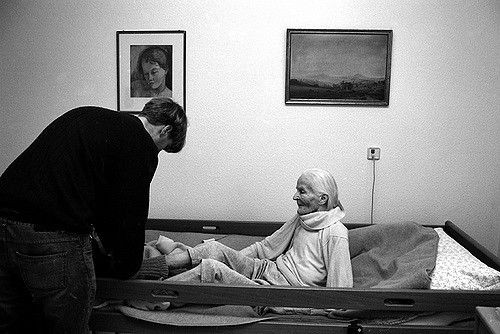Caregivers For The Elderly Have Higher Levels Of Financial, Emotional Stress

A new study published Monday in JAMA Internal Medicine sadly supports the saying that no good deed goes unpunished, not even for the devoted family of an elderly relative.
The study authors analyzed data from two earlier large studies to come up with a "national profile of family and unpaid caregivers who assist older adults with health care activities." From there, they concluded that caregivers who provided substantial medical help were more likely to report emotional, financial, and physical difficulties than those who provided no medical help. Additionally, they were more than five times more likely to report having trouble making time for enjoyable activities and three times more likely to report worse job productivity.
"Family caregivers providing substantial assistance with health care experience significant emotional difficulty and role-related effects, yet only one-quarter use supportive services," the authors wrote.
The prior studies the researchers looked at were the National Health and Aging Trends Study (NHATS) and National Study of Caregiving (NSOC), both of which began in 2011. The studies were linked to one another, making it so the caregivers surveyed in the latter were all recruited through the former.
From the 1,739 family and unpaid caregivers of 1,171 older adults with disabilities they looked at, they were able to estimate that the U.S. has 14.7 million caregivers assisting 7.7 million older adults. And while 3.8 million caregivers (26 percent) provided their elders no help when it came to health care, 4.4 million (29.8%) provided some help and 6.5 million (44.1 percent) provided substantial help. Nearly half of the latter group assisted older adults with dementia, and one-third helped adults with significant disabilities.
Just over 50 percent of substantial helpers experienced some or significant emotional difficulties related to their caregiving versus 30 percent of non-helpers, and around 30 percent of the former experienced financial troubles and physical difficulties compared to 13 percent of the latter.
Aside from having to take care of sicker people, another factor that might explain these differences is time, since substantial helpers on average put in the most hours per week, especially when compared to non-helpers (28.1 versus 8.3). That time crunch subsequently interfered with their ability to enjoy "valued activities" to a far greater degree than everyone else and 20 percent reported missing at least some time at work because of their added duties.
Of course, the study is hardly the first to document the unique hardships that caregivers of the elderly and the disabled often face, a population that is only rising alongside the number of people entering their senior years.
"Our findings contribute important insight regarding the 'invisible work' of managing complex care by documenting the significant caregiving-related effects that are experienced by family and unpaid caregivers who actively manage older adults’ health care," the authors wrote. "Effective psychosocial and coping interventions have been developed to support family caregivers, but they are largely disconnected from routine health care delivery. The lack of systematic identification and support of caregivers in mainstream care means that their information and support needs are not well understood and often remain unmet."
Source: Wolff J, Spillman B, Freedman V, et al. A National Profile of Family and Unpaid Caregivers Who Assist Older Adults With Health Care Activities. JAMA Internal Medicine. 2016.



























